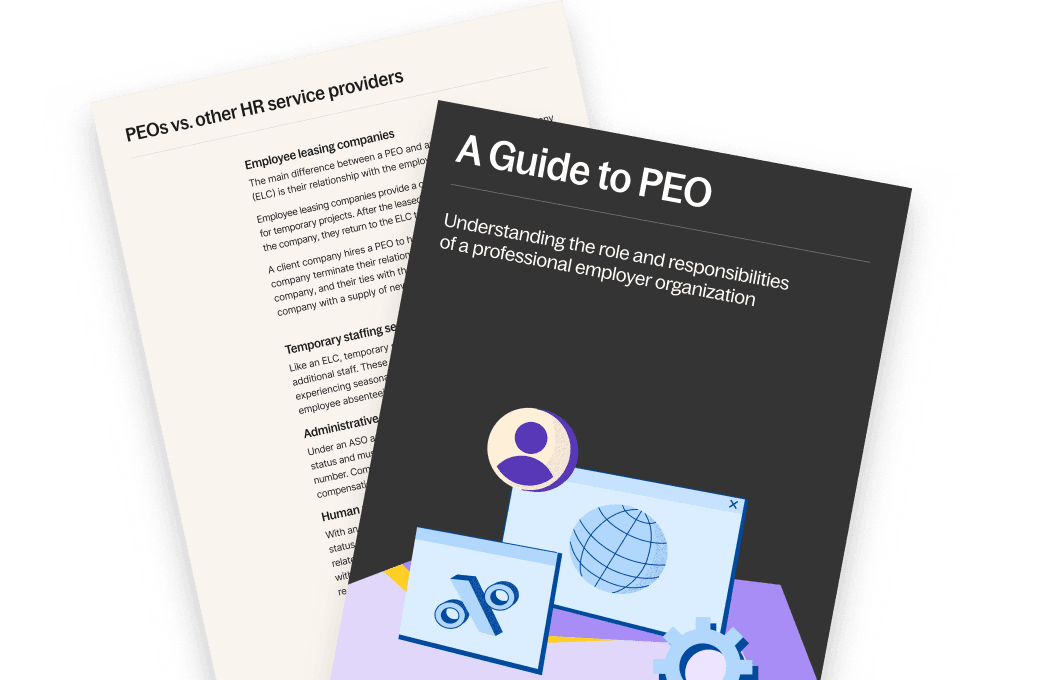Guide
A Guide to Professional Employer Organizations (PEO)
PEO

Get the resource for free
Professional employee organization (PEO) partnerships help HR teams balance complex payroll, labor laws, and competitive benefits without the administrative burnout. Companies that use a PEO typically grow twice as fast with a 12% lower turnover.
But to leverage a PEO effectively, you must understand where the PEO's role ends and yours begins.
This guide walks you through the division of responsibilities, empowering you to maintain control over core operations while benefiting from expert HR support.
What is inside this PEO guide?
Set your US-based team up for success with a clear breakdown of the co-employment model. This resource provides a professional shortcut to understanding how to scale your workforce while staying compliant.
In this guide, you will learn:
- How the co-employment relationship divides legal responsibilities between your company and the provider
- A checklist of your retained responsibilities, including day-to-day supervision and company culture
- Strategies to access Fortune 500-level health insurance and retirement plans for any company size
- Detailed comparisons between PEOs and other providers like EORs, ASOs, or HROs
- How to use a PEO to navigate complex COBRA and ACA reporting requirements
- Guidance on managing workers' compensation and employment practices liability insurance (EPLI)
Who is this guide for?
We designed this guide for leaders who need to simplify US workforce management:
- Founders and business owners in the US who own a local legal entity and need to scale payroll
- HR managers in rapid-growth companies struggling to keep up with increasing administrative burdens
- Finance teams looking to cut costs by leveraging economies of scale for insurance premiums
- Leaders in high-risk industries who need robust workers' compensation management
- Small businesses that lack a dedicated internal HR department and need to access professional expertise
How a PEO partnership works
A PEO acts as a strategic partner to handle time-consuming HR tasks. Under a co-employment arrangement, the PEO becomes the "employer of record" for tax purposes, reporting wages under their federal employer identification number (EIN). This relationship is governed by a client service agreement (CSA) that outlines exactly who is responsible for what.
While the PEO manages the "back-office" compliance, your company maintains full autonomy over the direction of the business. You still decide who to hire, what they do, and how your team culture evolves.
Key benefits of the PEO model
Engaging a PEO provides immediate advantages for companies looking to compete with larger enterprises:
- Access exclusive benefits: Offer top-tier medical, dental, vision, and 401(k) plans that attract high-level talent
- Improve local compliance: Leverage local legal experts to ensure you meet all state and federal labor laws
- Increase efficiency: Outsource repetitive tasks like payroll processing and benefits enrollment to focus on talent development
- Manage risk: PEOs assist with safety training and handling sensitive unemployment or harassment claims
How to use the professional employee organization guide
This tool is designed to help you navigate the transition to a co-employment model. Here is how to apply the insights found in the guide:
- Verify your entity status: Ensure you have a registered local legal entity in the region of operation
- Determine your headcount: Check if you meet the minimum employee requirements often needed to join a PEO
- Compare service providers: Use our comparison charts to decide if a PEO, ASO, or EOR fits your current growth stage
- Draft your implementation plan: Use the guide’s breakdown of HR expertise to configure your new PTO policies and employee handbooks
- Review the results: Evaluate how the PEO's payroll processing and tax filing will integrate with your existing accounting tools like QuickBooks or NetSuite
Pro Tip: If you are planning to hire outside of the US and do not have a local entity, consider the EOR model to engage international talent legally without opening foreign subsidiaries.
PEO: A modern solution for US teams
With a PEO, you can offload the hiring, management, and payroll of your US workforce—staying compliant across all 50 states. Download your guide today to learn more.
FAQs
What is a professional employee organization?
A professional employee organization (PEO) is a strategic partner hired to handle HR tasks like payroll, tax filing, and benefits administration. It operates through a co-employment relationship where the PEO assumes partial legal responsibility for employees.
PEO vs EOR: Which should I use?
Consider using a PEO if you have a local legal entity and want to share employer responsibilities while maintaining management control. An Employer of Record (EOR) may be better if you want to hire employees in a country where you do not have a foreign subsidiary, as the EOR acts as the full legal employer. Learn more about the differences between PEO vs EOR.
Does a PEO replace my internal HR team?
Not necessarily. For startups, a PEO can replace the need for an early in-house hire. For established companies, the PEO works collaboratively with your existing HR team to handle administrative red tape, allowing them to focus on high-level strategy.
What are the main differences between a PEO and an ASO?
Under an Administrative Services Outsourcing (ASO) arrangement, the client company retains full employer status and reports taxes using its own EIN. In a PEO model, the PEO’s EIN is used for wage reporting.
What services are not included in a PEO?
PEOs typically do not handle strategic decision-making, day-to-day employee supervision, production, marketing, or broader financial and accounting matters.